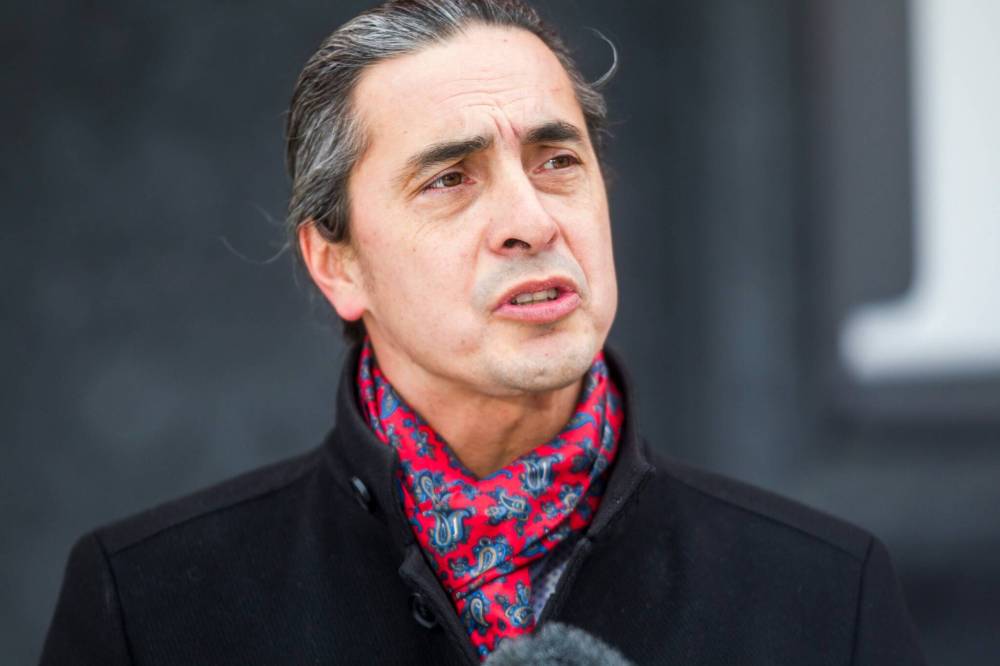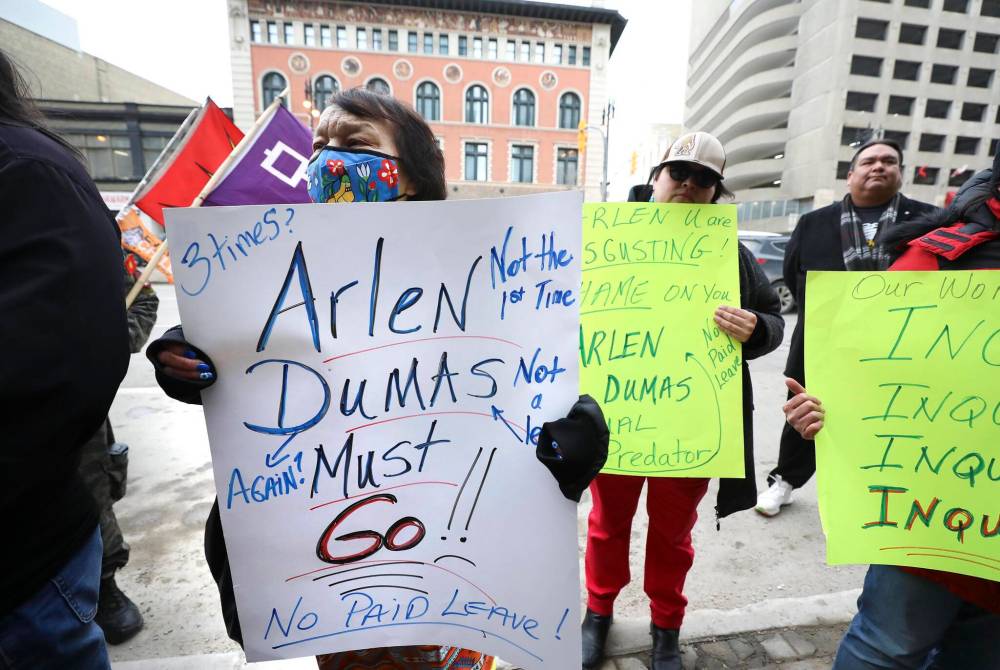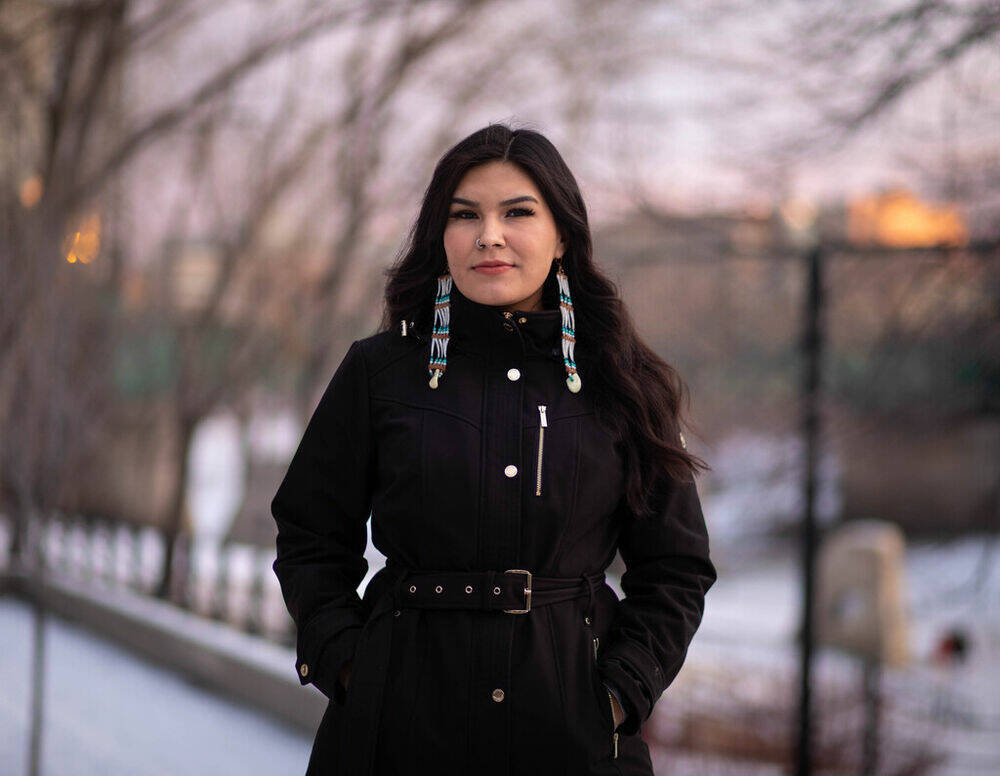AMC rejects proposal to hear women accusing grand chief of sexual harassment External Indigenous leaders suggest process to ensure accountability
Read this article for free:
or
Already have an account? Log in here »
To continue reading, please subscribe:
Monthly Digital Subscription
$19 $0 for the first 4 weeks*
- Enjoy unlimited reading on winnipegfreepress.com
- Read the E-Edition, our digital replica newspaper
- Access News Break, our award-winning app
- Play interactive puzzles
*No charge for four weeks then billed as $19 plus GST every four weeks. Offer only available to new and qualified returning subscribers. Cancel any time.
Read unlimited articles for free today:
or
Already have an account? Log in here »
Hey there, time traveller!
This article was published 05/05/2022 (964 days ago), so information in it may no longer be current.
The Assembly of Manitoba Chiefs has refused help from external First Nations leaders to address allegations of sexual harassment and assault against Grand Chief Arlen Dumas.
On March 31, Sandra DeLaronde, a respected facilitator who has spent decades advocating for Indigenous people in Manitoba, co-wrote a letter to the AMC with Hilda Anderson-Pyrz, a nationally recognized expert on gender-based violence against Indigenous women and girls.
The pair offered to facilitate a trauma-informed process for women with allegations of harassment against Dumas — and other chiefs — to share their stories and ensure the assembly takes them seriously.

DeLaronde and Anderson-Pyrz have heard from a handful of women who have yet to speak out publicly against Dumas, because they fear personal and professional repercussions. The assembly has ties to virtually all First Nations initiatives in the province.
In 2019, Dumas took a brief leave after 22-year-old Bethany Maytwayashing accused Dumas, who was nearly double her age, of sending texts and social media messages that made her feel “really creeped out.”
Two months ago, chiefs suspended Dumas after Winnipeg police opened a sexual-assault investigation, which is still active.
In that time, local activist Sadie-Phoenix Lavoie has come forward to allege “predator behaviour” in the form of late-night text messages from Dumas. Renée Yetman has also recounted a consensual sexual encounter in 2017 that left her feeling exploited.
The Free Press has heard similar accusations from a handful of women who have spoken with Anderson-Pyrz and DeLaronde.
“There’s a lot of talk on ground between people, and people roll their eyes, because it’s AMC,” DeLaronde said.
For years, she and Anderson-Pyrz have helped lead the Manitoba Coalition, a grassroots group that spent years pushing Ottawa to launch the national inquiry into missing and murdered Indigenous women and girls — and then for that inquiry to have a family centred process that looked less like a court.
They feel a similar idea would be best for dealing with claims against Dumas, and other chiefs.
“It’s not about just the grand chief; it’s in all these situations that women and girls have been victimized or traumatized — and nothing has been done,” said DeLaronde.
“It’s about a system, and how that system protects itself.”
The pair argue the AMC missed the mark when allegations about Dumas texting young women first surfaced in 2019.
Dumas denied Maytwayashing’s claim, saying his phone number was hacked, but then apologized for acting in ways that made women uncomfortable.
The AMC promised an internal probe, but nobody ever approached Maytwayashing, who had offered to have her phone examined. The group has rebuffed numerous queries about what exactly the investigation entailed.
The assembly could become an example of how to respect women by focusing on healing, instead of colonial concepts around whether or not someone is guilty of a specific criminal offence, DeLaronde said.

The AMC’s testimony to the national inquiry argued that women deserved “a process that was transparent, accountable to them” instead of imposing processes that might protect those accused of harm, she noted.
“This current circumstance doesn’t appear to be consistent,” she said.
The letter also sought clarity on whom the AMC commissioned to do investigations into its workplace culture, and whether they have experience with human-rights issues and trauma support.
The AMC replied to the proposal from Anderson-Pyrz and DeLaronde by pointing out an existing press release pointing out that Dumas would eventually face a non-confidence vote.
Last week the assembly postponed that vote, originally scheduled Wednesday, until after an internal investigation has been completed.
Shamattawa Chief Eric Redhead was appointed to serve as interim grand chief until stepping down last month to run for provincial office. Redhead said chiefs considered the proposal, but were advised against it.
“My understanding is they consulted with legal (officials) and right now, until the investigation is complete, that was not on the table,” he said.

The Free Press asked interim grand chief Cornell McLean for an interview. Instead, the assembly sent a statement.
“The AMC takes the allegations made against Grand Chief Dumas very seriously and has suspended him from his position pending the results of an impartial investigation,” wrote policy analyst Marcel Balfour.
“The AMC is required to maintain the integrity of the investigation and the confidentiality of the person who made the complaint against Grand Chief Dumas, therefore, no details will be shared with the media at this time.”
dylan.robertson@freepress.mb.ca



